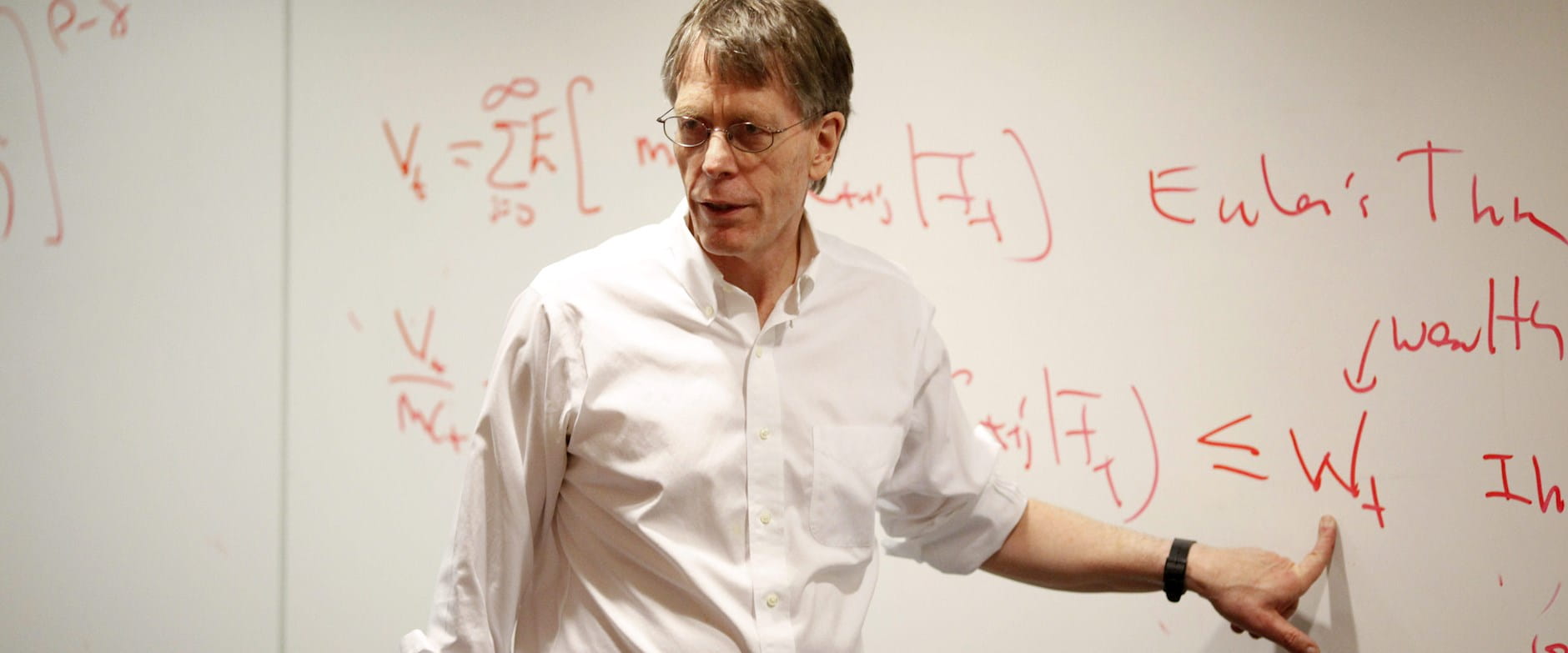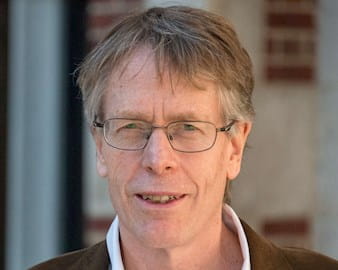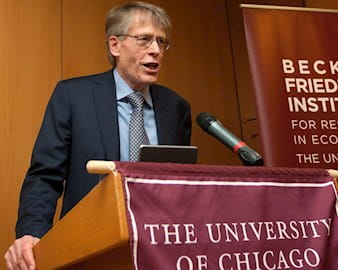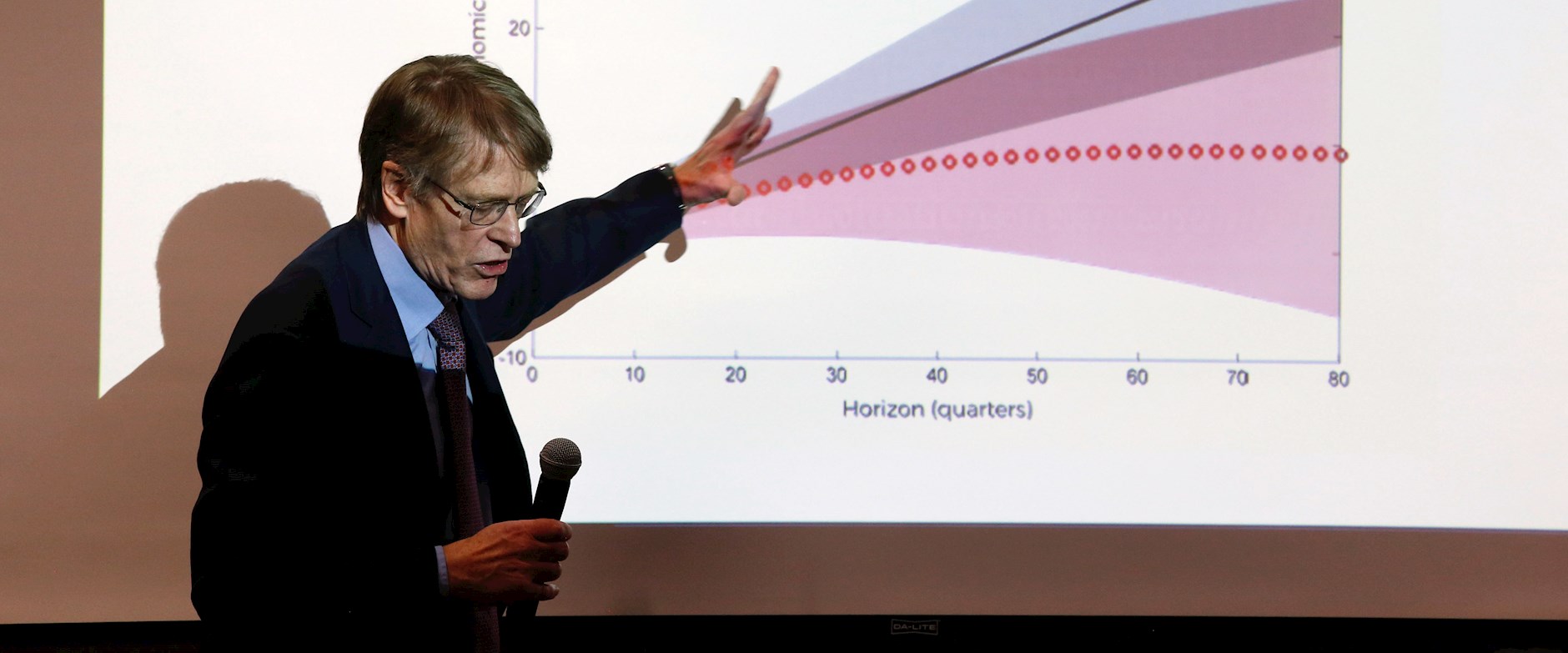
1974
Graduated from Utah State University with a BS in mathematics and political science


Lars Peter Hansen is a leading expert in economic dynamics who has made fundamental advances in our understanding of how economic agents cope with changing and risky environments.
But Hansen wasn’t always academically inclined. Born in Urbana, Illinois, he attended high school in Utah, where he struggled in school and brought home report cards with double check marks for “does not respect authority.” It was only when he enrolled as an undergraduate at Utah State University that he discovered an affinity for scholarly work.
“I met some great teachers who took a genuine interest in me and encouraged my talents and my thinking,” he later recalled. “They had a big influence on me.”
Inspired by his professors, he combined his undergraduate studies in political science and mathematics with an accelerated curriculum in economics. Later, at the University of Minnesota, he supplemented his PhD in economics with math courses in analysis, probability theory, and statistics.
As a researcher, he has drawn on his background in math and statistics to add to our understanding of the macroeconomy. For example, he has contributed to the development of statistical methods designed to explore the interconnections between macroeconomic indicators and assets in financial markets—methods that are widely used in empirical research in financial economics today. It was those contributions that earned him the Nobel Prize in 2013.
Hansen’s most recent work focuses on uncertainty and its relationship to long-term risks in the macroeconomy. He is part of a team that has designed methods for modeling economic decision-making in environments in which uncertainty is hard to quantify. “While uncertainty is unavoidable and pervasive in our lives, in many discussions of economic analysis and policy, it unfortunately takes a back seat,” he said. “We should instead push uncertainty to the forefront of our thinking.”
Professor Hansen is the faculty director of the Macro Finance Research Program at the Becker Friedman Institute for Economics at the University of Chicago.

“Thinking about uncertainty in broader terms opens the door to a more sensible approach to thinking about economic policy design, and it allows the public to accept the fact that a discipline like economics doesn’t have answers to everything.”
—Lars Peter Hansen
Lars Peter Hansen’s Nobel Prize–winning work has played an important role in shaping the modern understanding of asset pricing and the way that economists model complex financial markets. In addition, his work on improving models that measure risk and uncertainty has had important implications for financial markets, fiscal policy, and the macroeconomy. For example:


Graduated from Utah State University with a BS in mathematics and political science

Earned PhD in economics from the University of Minnesota
1978
Joined the UChicago faculty
1981
Held a Sloan Foundation Fellowship
1982-84
Became a member of the American Academy of Arts and Sciences
1993
Became a fellow of the National Academy of Sciences
1999
Served as president of the Econometric Society
2007-08
Was appointed as inaugural director of the Milton Friedman Institute, which later became the Becker Friedman Institute for Economics
2009
Won the BBVA Foundation Frontiers of Knowledge Award in Economics, Finance, and Management
2010
Won the Nobel Prize in Economic Sciences alongside Eugene F. Fama of Chicago Booth and Robert J. Shiller of Yale University
2013
Was awarded the Erwin Plein Nemmers Prize in Economics from Northwestern University
2016
Joined the Booth faculty, with a co-appointment with the Kenneth C. Griffin Department of Economics at the University of Chicago
2017To learn more about Professor Hansen and engage with him on social media, visit his website and follow him on Twitter.

A framework to compute investors’ exposure to macroeconomic shocks.
How Much Is That Risky Asset Worth?
Data are indispensable to understanding economic outcomes—but they need theory to be made useful.
Purely Evidence-Based Policy Doesn’t Exist
Good policy making recognizes and adapts to the uncertainty inherent in model building.
How Quantitative Models Can Help Policy Makers Respond to COVID-19